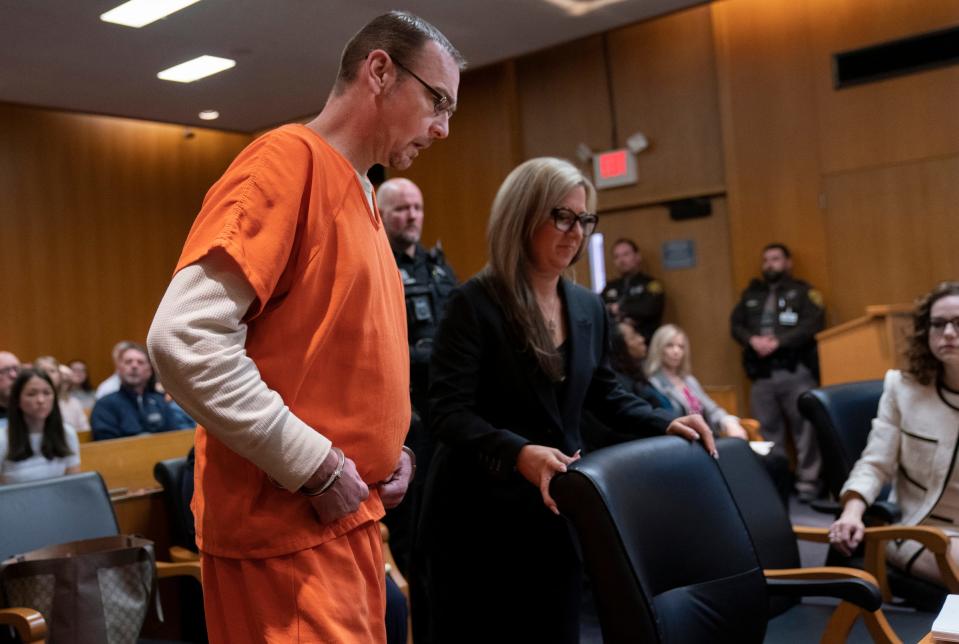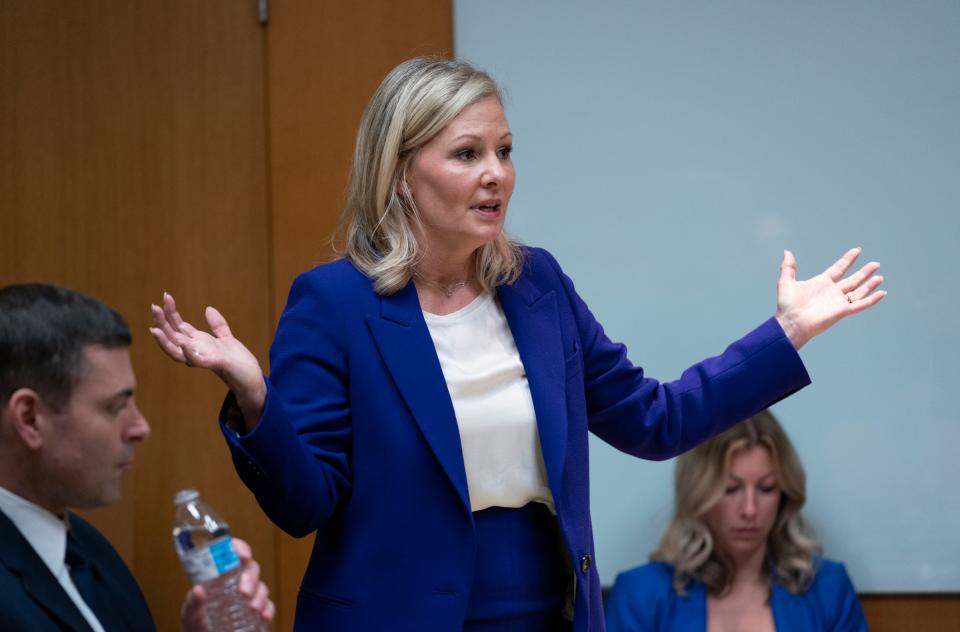Oxford school shooter needs dad's help — but James Crumbley won't give it
From behind bars, convicted Oxford High School shooter Ethan Crumbley needs help from his parents — only his dad isn't willing to give it, if new court filings are any indication.
The teenager, who is challenging his life-without-parole sentence, wants access to his parents' confidential presentencing reports, claiming they contain "relevant and necessary" information to his appeal, particularly involving his upbringing.
But like the shooter — who refused to testify or let his parents use his confidential medical records at their historic trials — the father is objecting to letting his son use his private information to advance his appeal. Specifically, James Crumbley, who was convicted of involuntary manslaughter over his role in the 2021 massacre carried out by his son, objects to giving the shooter access to his presentence investigation report that includes private details about his personal and family life.
If Ethan Crumbley wants his lawyers to know about his family and home environment growing up, the dad's legal team argues, then the teen can tell them himself.

Dad: 'Ethan is capable' of explaining his childhood
"Ethan is capable of advising his counsel about his childhood, his parents and his home environment," appellate attorney Alona Sharon argues in court documents, maintaining the shooter's lawyers have "failed to explain ... why they cannot learn this evidence from Ethan directly."
Sharon adds: "Whatever information counsel seeks to discover through the PSIRs, they can certainly learn it from their own client."
And if the shooter's new defense team is trying to prove the teenager's initial lawyers were ineffective, Sharon argues, they can learn more about that by consulting with the shooter — not reviewing the dad's presentencing investigation report, which also contains information about James Crumbley's mental health, job, and financial status.
None of this, the dad's lawyer argues, is relevant to the factors that were considered at his son's Miller hearing, when a judge concluded a life-without-parole sentence was appropriate for the shooter, who was 15 when he carried out his massacre inside the halls of Oxford High School on Nov. 30, 2021.
The shooter also wants access to his mom's presentence investigation report, in which Jennifer Crumbley talks about, among other things, her consumption of alcohol — the prosecution portrayed her as having a drinking problem — and alleges that her husband engaged in threatening behavior. Jennifer Crumbley's appellate lawyer has not yet responded to the shooter's request to access his mom's presentence investigative report.
Defense: We have new witnesses to shooter's childhood
Ethan Crumbley, who is now 17, pleaded guilty last year to murdering four classmates and injuring six other students and a teacher in a 2021 rampage he carried out using a gun that his father had purchased him just four days prior. His parents, James and Jennifer Crumbley, also were charged in the case and made history this year after two separate juries convicted each parent of involuntary manslaughter for their roles in the deaths of four students: Madisyn Baldwin, 17; Tate Myre, 16; Justin Shilling, 17, and Hana St. Juliana, 14. The parents were both sentenced to 10-15 years in prison last month after separate juries determined that the parents were culpable for ignoring troubling warning signs their son exhibited ahead of the shootings and buying him a gun instead of getting him help. Both are appealing.
In the wake of his parents' landmark prosecutions — they're the first parents in America charged in a mass school shooting carried out by their child — the shooter is now looking to shorten his sentence by, in part, challenging how his initial lawyers handled his case.
Specifically, the teenager's appellate lawyers say they have interviewed witnesses who never previously came forward with details about the boy's childhood. As the defense team points out, no lay witnesses ever testified on the shooter's behalf prior to his guilty plea hearing, at his sentencing, or at his crucial Miller hearing. This is the hearing, required by law, during which a judge hears information regarding whether it's appropriate to sentence a juvenile to life without parole, which Oakland County Prosecutor Karen McDonald successfully argued was appropriate in this case.
At that hearing, the shooter's lawyer, Paulette Loftin, argued the boy deserved a chance to prove he could be rehabilitated. So did a psychologist, who is considered an expert witness. But there were no lay witnesses to testify on his behalf, nor to offer insight into his childhood.
A lay witness is someone who can testify about their firsthand knowledge about a case or a defendant, such as what they heard, saw, said, or did. Lay witnesses are typically individuals who were present at the scene of an incident, were involved in the circumstances leading to the case, or possess knowledge that could shed light on the case's facts.
In the Oxford shooter's case, the appellate team says it now has such witnesses who have provided "sensitive information about Ethan and his family when Ethan was a minor."
Family witnesses fear harassment
"Ethan plans to offer lay witness statements that were not obtained, nor offered to this court prior to (his) plea or sentencing," appellate defenders Jacqueline Ouvry and Alison Swain argue in a May 10 filing. "These statements will provide observations of Ethan's family background and information relevant to his development, and will illuminate the limited extent of the defense investigation prior to his sentence."
According to the appeals team, the new witness statements "also inform expert review, which is necessary to identify symptoms of mental and behavioral impairment, as well as mental illness, neurological deficits, neglect and maltreatment during developmental years; environmental influences on behavior, effects of substance abuse and severity and consequences of exposure to trauma."
The appellate lawyers did not identify who the witnesses are and have sought to keep their identities confidential, maintaining the witnesses "have expressed reluctance to have their names in the public domain regarding this case."
"Some have indicated that they have already had law enforcement — armed and lights flashing — respond to their homes, some have been bombarded by press requests ... and some, particularly those who work in education, have expressed fear of impact on their employment."
The defense team did suggest, however, that some of the witnesses are relatives, writing:
"Many extended family members feel conflicted about the information they possess. They fear harassing calls they may receive, potentially from family, by being identified as related to this case."
Judge: Public witness outweighs witness concerns
The shooter's lawyers asked Oakland County Circuit Judge Kwame Rowe whether he would let them file exhibits containing the witnesses statements under seal to protect their privacy. The prosecution and judge, however, would have the names.
The prosecution objected to this request, maintaining "there is no legitimate privacy interest" in sealing the exhibits, and suggested the defense could file redacted documents instead using only the initials of the witnesses.
Judge Rowe agreed, concluding that using only the witnesses' initials could help alleviate fears of harassment, but that a "blanket order to seal information" isn't warranted.
"There are several hundred victims that have a legitimate interest in the outcome of this case," Rowe writes in his May 15 order, adding "the public interest here outweighs any potential for harassment."
Shooter's mental health remains key issue
A key issue in both the shooter's and parents' criminal cases was the mental health of the boy.
This was a particularly thorny issue for the parents as the prosecution made contradictory statements on this matter. For example, in seeking to lock up the shooter forever, prosecutors argued the boy was not mentally ill, delusional or psychotic, but knew what he was doing.

But in the parents' case, the prosecution argued the Crumbleys ignored a mentally ill son who was in distress, and pleading for help.
The Crumbleys sought to discredit this narrative, but were hamstrung as their son refused to testify in their case and prevented them from using any of his medical records at trial.
And while the Crumbleys were allowed to have access to their son's forensic report and mental health treatment records, they weren't allowed to cite them at trial. As James Crumbley's lawyer argues in court records: "he was absolutely not able to use them in preparation for trial."
Of particular interest to the Crumbleys was their son allegedly telling a psychiatrist that he lied to a friend when he said his parents' refused to get him help for mental health struggles. The parents couldn't use that information at trial because the son asserted privilege over it, though this issue apparently impacted the jury. The jury foreman told the Free Press that among the key issues that led him to convict the father was the son claiming that his dad ignored his pleas for help, which he wrote about in texts to a friend and in his journal.
Like father, like son
The parents' juries got to see the shooter's text messages to his friend and excerpts from his journal, but the parents couldn't challenge the texts or the journal entries because Ethan Crumbley refused to testify.

And they couldn't offer evidence to contradict the texts or journal because Ethan Crumbley asserted privilege over his medical records and interviews he had with psychiatrists.
Now, the dad is doing the same, at least when it comes to his presentence investigation report.
"Mr. Crumbley indicates he will not agree to the release of his PSIR," Sharon writes, adding Ethan Crumbley's appellate team can get the information it wants by other means: Either by asking their client, or review the trial transcript from the dad's case.
Dad's lawyer: son's appeal is not an urgent matter
As for the shooter's defense team maintaining "appellate deadlines are fast approaching," Sharon writes they can seek an extension from the Michigan Court of Appeals.
Sharon also disputes that this is an urgent matter.
"Time is not of the essence for Ethan Crumbley’s appeal," Sharon writes, "because even if his sentence is reversed the lowest sentence he can receive upon resentencing would be 25 years."
Contact Tresa Baldas:tbaldas@freepress.com
This article originally appeared on Detroit Free Press: Ethan Crumbley wants parents' presentencing reports for appeal

